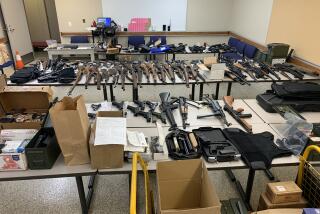Rights of Moussaoui at Issue
- Share via
WASHINGTON — A judge asked the government in March to consider whether terrorism suspects such as Zacarias Moussaoui should be prosecuted in civilian courts, according to a transcript released Monday.
U.S. District Judge Leonie M. Brinkema was reacting to the government’s insistence that Moussaoui be denied access to a witness who could exonerate him or spare his life if a trial reached punishment phase.
Brinkema released her heavily edited opinion a day before an appellate panel in Richmond, Va., was to hear oral arguments on whether Moussaoui -- an acknowledged Al Qaeda loyalist -- could question a former leader of the terrorist organization in a closed-circuit hookup. He is the lone U.S. defendant charged with conspiring with the Sept. 11 hijackers.
The Justice Department, in papers submitted previously to the U.S. 4th Circuit Court of Appeals, said terrorism suspects would gain the advantage in criminal trials if the judges were to allow the questioning.
Brinkema ruled in January that Moussaoui had the same right as any other defendant to potentially favorable information and that he could question a senior Al Qaeda leader, Ramzi Binalshibh, through a closed-circuit TV hookup. Her March opinion offered her reasons for the January ruling.
“To the extent that the United States seeks a categorical, ‘wartime’ exception” to Moussaoui’s rights, she said, “it should reconsider whether the civilian criminal courts are the appropriate fora in which to prosecute alleged terrorists captured in the context of an ongoing war.”
A military tribunal could set greater secrecy rules on national security matters and limit a defendant’s rights in some instances.
Brinkema said in her ruling, “Because a criminal trial is a quest for the truth ... both the defendant and the public will be denied a fair trial if Moussaoui is deprived of the opportunity to present testimony.”
Predicting dire consequences if the interview were to take place, prosecutors said in written pleadings that “almost any indicted terrorist could undermine his prosecution by claiming a need for access to enemy combatants.” The government does not want any unauthorized people -- let alone terrorism suspects -- to interfere with interrogations.
While defendants normally have such access to witnesses and data that might exonerate them, the government argued that the rules changed in this case because Binalshibh is an enemy combatant and because courts have no authority to interfere with his interrogation.
More to Read
Sign up for Essential California
The most important California stories and recommendations in your inbox every morning.
You may occasionally receive promotional content from the Los Angeles Times.












